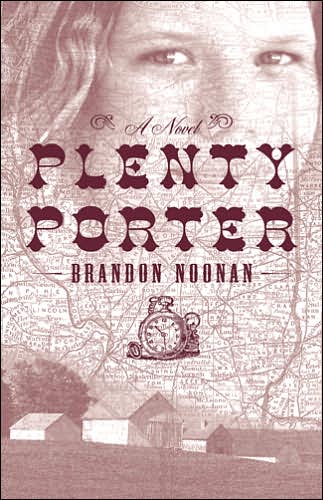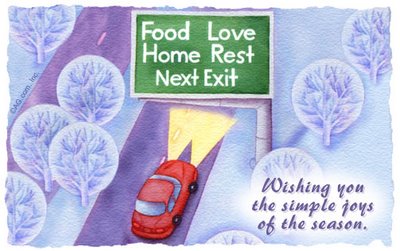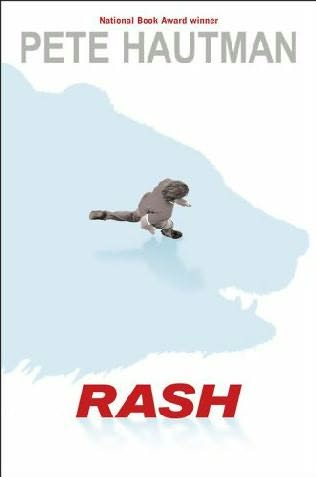This was forwarded to me in an email this week:
Memo to All English Faculty
Tentative Summer Reading List of Nameless High School
Prep: A Novel (Paperback) by Curtis Sittenfeld
From
Publishers Weekly: A self-conscious outsider navigates the choppy waters of adolescence and a posh boarding school's social politics in Sittenfeld's A-grade coming-of-age debut. The strong narrative voice belongs to Lee Fiora, who leaves South Bend, Ind., for Boston's prestigious Ault School and finds her sense of identity supremely challenged. Now, at 24, she recounts her years learning "everything I needed to know about attracting and alienating people." Sittenfeld neither indulges nor mocks teen angst, but hits it spot on: "I was terrified of unwittingly leaving behind a piece of scrap paper on which were written all my private desires and humiliations. The fact that no such scrap of paper existed... never decreased my fear." Lee sees herself as "one of the mild, boring, peripheral girls" among her privileged classmates, especially the über-popular Aspeth Montgomery, "the kind of girl about whom rock songs were written," and Cross Sugarman, the boy who can devastate with one look ("my life since then has been spent in pursuit of that look"). Her reminiscences, still youthful but more wise, allow her to validate her feelings of loneliness and misery while forgiving herself for her lack of experience and knowledge. The book meanders on its way, light on plot but saturated with heartbreaking humor and written in clean prose. Sittenfeld, who won Seventeen's fiction contest at 16, proves herself a natural in this poignant, truthful book. Copyright © Reed Business Information, a division of Reed Elsevier Inc. All rights reserved. --This text refers to the Hardcover edition.
HARRY POTTER AND THE HALF-BLOOD PRINCE By J. K. Rowling. Illustrated by Mary GrandPré.
In this sixth volume of the epic series, the Dark Lord, Voldemort, is wreaking havoc throughout England and Harry, now 16, is more isolated than ever.
From
School Library Journal: Grade 5 Up–It's no surprise that everyone's favorite teen wizard is still battling Voldemort. What does perplex the young hero is a forgotten textbook with secret writing that brings together
Harry Potter and the Half-Blood Prince (Scholastic, 2005). J. K. Rowling returns Harry, Hermione, and Ron to Hogworts amidst troubling signs that the Dark Lord and the Deatheaters are gaining strength. Fortunately, Headmaster Dumbledore is helping his apt pupil prepare for an expected showdown by taking Harry to remembered incidents in the life of his old enemy. Less dangerous, but still disturbing, Ron and Hermione have put Harry in the middle of their incessant bickering. Then there's Slytherin Prefect Draco Malfoy who's under orders to commit murder–but who is his intended victim? Finally, Professor Snape is now teaching the Defense of the Dark Arts class, but he appears to be doing some dark deeds of his own. A blossoming relationship with Ginny Weasley is a bright spot for Harry, but another personal loss forces him to make some grave decisions by the novel's end. - Barbara Wysocki, Cora J. Belden Library, Rocky Hill, CT: Copyright © Reed Business Information, a division of Reed Elsevier Inc. All rights reserved.
Paddy Clarke Ha Ha Ha (Paperback) by Roddy Doyle
Amazon.comIn Roddy Doyle's Booker Prize-winning novel
Paddy Clarke Ha Ha Ha, an Irish lad named Paddy rampages through the streets of Barrytown with a pack of like-minded hooligans, playing cowboys and Indians, etching their names in wet concrete, and setting fires. Roddy Doyle has captured the sensations and speech patterns of preadolescents with consummate skill, and managed to do so without resorting to sentimentality. Paddy Clarke and his friends are not bad boys; they're just a little bit restless. They're always taking sides, bullying each other, and secretly wishing they didn't have to. All they want is for something--anything--to happen.
Throughout the novel, Paddy teeters on the nervous verge of adolescence. In one scene, Paddy tries to make his little brother's hot water bottle explode, but gives up after stomping on it just one time: "I jumped on Sinbad's bottle. Nothing happened. I didn't do it again. Sometimes when nothing happened it was really getting ready to happen." Paddy Clarke senses that his world is about to change forever--and not necessarily for the better. When he realizes that his parents' marriage is falling apart, Paddy stays up all night listening, half-believing that his vigil will ward off further fighting. It doesn't work, but it is sweet and sad that he believes it might. Paddy's logic may be fuzzy, but his heart is in the right place. --Jill Marquis
From
Publishers Weekly: Doyle's Booker Prize-winning novel, told from the perspective of Irish, working-class 10-year-old Paddy Clarke, was a seven-week PW bestseller.
The March: A Novel (Paperback) by E.L. Doctorow
From
Publishers Weekly: Starred Review. Sherman's march through Georgia and the Carolinas produced hundreds of thousands of deaths and untold collateral damage. In this powerful novel, Doctorow gets deep inside the pillage, cruelty and destruction—as well as the care and burgeoning love that sprung up in their wake. William Tecumseh Sherman ("Uncle Billy" to his troops) is depicted as a man of complex moods and varying abilities, whose need for glory sometimes obscures his military acumen. Most of the many characters are equally well-drawn and psychologically deep, but the two most engaging are Pearl, a plantation owner's despised daughter who is passing as a drummer boy, and Arly, a cocksure Reb soldier whose belief that God dictates the events in his life is combined with the cunning of a wily opportunist. Their lives provide irony, humor and strange coincidences. Though his lyrical prose sometimes shades into sentimentality when it strays from what people are feeling or saying, Doctorow's gift for getting into the heads of a remarkable variety of characters, famous or ordinary, make this a kind of grim Civil War Canterbury Tales. On reaching the novel's last pages, the reader feels wonder that this nation was ever able to heal after so brutal, and personal, a conflict. -- Copyright © Reed Business Information, a division of Reed Elsevier Inc. All rights reserved
ON BEAUTY, by Zadie Smith.
From
Publishers Weekly: Starred Review. This is a superb novel, a many-cultured Middlemarch, but it's a rough one for an actor. James juggles a large cast of Brits and Yanks, middle- and working-class white, African-American, West Indian and African men and women, as well as street teens, wannabe street teens and don't-wannabe street teens. James has a beautiful, deep voice that at first seems antithetical to Smith's ship of fools, but he enhances the humor and pathos with vocal understatement. He helps give characters their rightful place in the saga. The parade of characters swirl around two antagonistic Rembrandt scholars in a Massachusetts college town. Howard Belsey is a self-absorbed, working-class British white man married to African-American Kiki and father to three cafe-au-lait children. Monty Kipps is a West Indian stuffed-shirt married to the generous Carlene, with a gorgeous daughter, Veronica. The book is funny and infuriating, crammed with multiple shades of love and lust, midlife and teenlife crises. Class, race and political conflicts are generally an integral part of a story that occasionally strays from its center. The theme of beauty as counterpoint to individual, family, cultural and social foibles and failures ribbons through the novel and wraps it up, perhaps to say that Beauty is, finally, the only Truth. -- Copyright © Reed Business Information, a division of Reed Elsevier Inc.
The Painted Drum: A Novel (Paperback) by Louise Erdrich
From
Publishers Weekly Starred Review: Though Erdrich's latest lyrical novel returns to Ojibwe territory (Four Souls; Love Medicine, etc.), it departs from the concentrated vigor of her best work in its breadth of storytelling. Erdrich essays the grief that comes when the sins of parents become mortal for their children. Native American antiquities specialist Faye Travers, bereaved of her sister and father, ambivalently in love with a sculptor who has lost his wife and loses his daughter, stumbles onto a ceremonial drum when she handles the estate of John Jewett Tatro, whose grandfather was an agent at the Ojibwe reservation. Under its spell, she secrets it away and eventually repatriates it to that reservation on the northern plains—the home of her grandmother. The drum is revived, as are those around it. Gracefully weaving many threads, Erdrich details the multigenerational history surrounding the drum. Despite her elegant story and luminous prose, many of the characters feel sketchy compared to Erdrich's previous titans, and several redemptions seem too pat. But even at low voltage, Erdrich crafts a provocative read elevated by beautiful imagery, as when children near death fly off like skeletal ravens.
NON-FICTION
BOSS TWEED: The Rise and Fall of the Corrupt Pol Who Conceived the Soul of Modern New York By Kenneth D. Ackerman.
From
Bookmarks Magazine
For historians, Tweed "is worth his weight in gold" (New York Times). Ackerman, who has written previous books on Gilded Age excesses, focuses on the years after 1870 when Tweed hopscotched between court and jail. Critics agree that Tweed, his cronies, and the crusading journalists responsible for his spectacular downfall come alive. Colorful details and a clear-eyed approach to both Tweed’s great leadership and even greater crimes highlight his opportunist philosophy and antics, though his formative years remain a mystery. A poor sense of chronology, combined with failures to address revisionist claims that Tweed was an "honest grafter" and examine his effect on the "soul of modern New York," weaken the book. Despite these flaws, Boss Tweed is an excellent history with modern-day parables.
...
These are the books passed along to me by an English teacher at a high school which shall remain nameless... she is bemused and somewhat horrified by what is seen as a "contemporary" summer booklist, or the beginnings of such. Contemporary, meaning... ? We're not sure. I'm not questioning the value of the books themselves. I've read a couple of these, and what I have read is quite good. There are several really strong authors, etc., that interest my more adult tastes, but as hard as it is to get some teens to read, I think, to put it mildly, some other choices could have been made. I suppose the department head was trying to be sure that minorities were represented, and women, and military personnel, and rich kids and beleagured wizards... Honestly, I am looking, but I can't figure out what else was going on in their head. I cannot imagine being the English teacher required to have a discussion with high school freshmen about any of these texts.Forgive my snark for saying so, but sometimes I am glad I opted not to teach English for a living. This would give me such a headache.
 Since I always hated babysitting, I never got into the original Baby-Sitters Club series even though I was at the right age when it came out. However, the graphic novel version of the first book in Ann M. Martin's popular series has been nicely adapted with an all-American "funny papers" style of artwork from Raina Telgemeier. With the same strong storyline dealing with girls' friendships, family relationships, and responsibility, it's sure to be as popular with young girls now—the baby-sitting ones, at least—as it was then.
Since I always hated babysitting, I never got into the original Baby-Sitters Club series even though I was at the right age when it came out. However, the graphic novel version of the first book in Ann M. Martin's popular series has been nicely adapted with an all-American "funny papers" style of artwork from Raina Telgemeier. With the same strong storyline dealing with girls' friendships, family relationships, and responsibility, it's sure to be as popular with young girls now—the baby-sitting ones, at least—as it was then.
 attention to her, but Plenty doesn't seem to worry about that, or about the fact that she is mostly a strange kind of outsider -- befriending the Coloreds and attending a private school for children of privilege. There is a distance in the voice that makes Plenty seem a little separate from her own emotions, and it makes it difficult for readers to hone in on exactly who they're meant to cheer for as a character.
attention to her, but Plenty doesn't seem to worry about that, or about the fact that she is mostly a strange kind of outsider -- befriending the Coloreds and attending a private school for children of privilege. There is a distance in the voice that makes Plenty seem a little separate from her own emotions, and it makes it difficult for readers to hone in on exactly who they're meant to cheer for as a character.


 chance to see how the working world works, and Alice is excited that her twenty-four year old brother is confiding in her a little. He's even invited her over to dinner while his girlfriend is there. Alice is spinning sugar-plum fancies about the wedding that she is sure will come between her brother and his "woman of color," which she is so fond of saying -- and thinking about. Alice's random black/white wedding plans come crashing down around her when the "woman of color" says no. The fianceé is quickly taken out of the picture, so readers never find out why the girl was dating her brother when her family would have been so upset had she married him. Since Alice is the type of girl who would've asked, I found this lack of information intriguing. Is Naylor saying that this is the type of questions that girls are not supposed to ask?
chance to see how the working world works, and Alice is excited that her twenty-four year old brother is confiding in her a little. He's even invited her over to dinner while his girlfriend is there. Alice is spinning sugar-plum fancies about the wedding that she is sure will come between her brother and his "woman of color," which she is so fond of saying -- and thinking about. Alice's random black/white wedding plans come crashing down around her when the "woman of color" says no. The fianceé is quickly taken out of the picture, so readers never find out why the girl was dating her brother when her family would have been so upset had she married him. Since Alice is the type of girl who would've asked, I found this lack of information intriguing. Is Naylor saying that this is the type of questions that girls are not supposed to ask? American -- nobody knows him well enough to say much else, and Jeeta's mother, Purnima, is anxious to make a good match for her daughter, and will not hear questions on the matter.
American -- nobody knows him well enough to say much else, and Jeeta's mother, Purnima, is anxious to make a good match for her daughter, and will not hear questions on the matter.

 won't be long before he is following in their footsteps, his mother wet-eyed and wailing, and his grandfather, a cynical old man born in 1990 who is wistful about a past that includes such things as legal french fries and jail for things like murder and drugs, scowling and muttering along behind them.
won't be long before he is following in their footsteps, his mother wet-eyed and wailing, and his grandfather, a cynical old man born in 1990 who is wistful about a past that includes such things as legal french fries and jail for things like murder and drugs, scowling and muttering along behind them. used-bookish smell. Normally, I love old books, and have found some great treasures I missed by not being born in the 1960's, including books by
used-bookish smell. Normally, I love old books, and have found some great treasures I missed by not being born in the 1960's, including books by 
 her, Charlie's angry and impatient, knowing the story she wanted to tell, but seeing herself fail miserably to reach that perfect place. She thinks she's doing the best she can, and she's weary of the way the end of the year has gone. Imagination, her creative writing teacher tells her, you've got to use yours. Charlie thought she had been doing that, and the criticism stings more than she can take.
her, Charlie's angry and impatient, knowing the story she wanted to tell, but seeing herself fail miserably to reach that perfect place. She thinks she's doing the best she can, and she's weary of the way the end of the year has gone. Imagination, her creative writing teacher tells her, you've got to use yours. Charlie thought she had been doing that, and the criticism stings more than she can take.